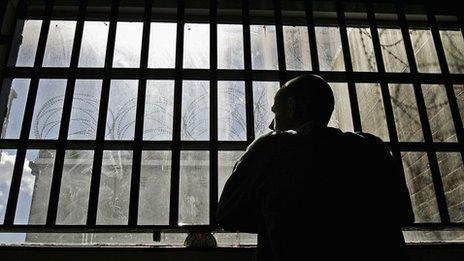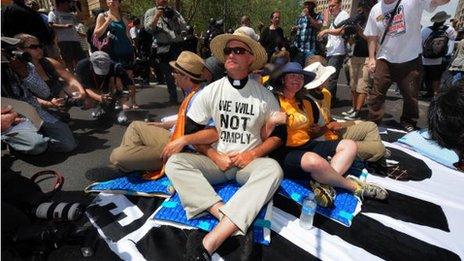Supreme Court ruling keeps US immigration debate alive
- Published
- comments
.jpg)
The Supreme Court said on Monday that its ruling on healthcare would be due on Thursday
A woman in a red dress races down the white marble steps of the Supreme Court, a sheaf of papers clutched in her hand.
Her colleague, all ready to go live on cable TV, grabs them and flicks through the ruling. It is an important judgment, external - but it is not the big one, the ruling on US President Barack Obama's healthcare reforms.
Political Washington is still on tenterhooks. Those most deeply involved are in a state of nerve-wracking suspended animation until the ruling drops, constantly scouring Twitter, external for rumours of rumours and Scotusblog, external for facts.
On the steps of the court a Tea Party group chants "strike it down, strike it down". Members of an anti-abortion group drop to their knees and pray that it will be ruled unconstitutional.
Another group demonstrating demands, with more determination than expectation, that if "Obamacare" is killed it should be replaced with a single-payer system. That term is what Americans call a taxpayer-funded scheme like the NHS, external.
'Leadership on immigration'
The waiting is not over, but some of the enervating uncertainty has gone. The judges will rule on Thursday.
Most still expect, external them to humiliate Mr Obama and possibly change the dynamics of this year's election. It will be, as the vice-president might say, a "big [expletive deleted] deal, external".
The rulings that have come today are still important. Among them is one on Arizona's hugely controversial law aimed at curbing illegal immigration, external.
It is something of a mixed bag, external. It upholds the most dramatic and eye-catching part of the legislation, which makes it the duty of police officers to ask for immigration papers when stopping people.
.jpg)
The Arizona ruling was just one of several important rulings due from the Supreme Court this week
But it rules against three other parts, external of the law, undermining Arizona's ability to do much practical about those they ask for papers.
The court says they cannot make being an illegal immigrant an offence, cannot make it a crime for them to take a job and cannot force them to carry papers.
It is not the end of the matter and the Arizona courts and legislature still have to have another say. So this keeps the issue alive rather than provides a definitive ruling.
On the whole, this is moderately good news for Mr Obama, not least because it raises more questions for his Republican opponent Mitt Romney about a subject he would rather avoid, external.
Romney has issued a statement saying: "Today's decision underscores the need for a president who will lead on this critical issue and work in a bipartisan fashion to pursue a national immigration strategy. President Obama has failed to provide any leadership on immigration."
But he will not be talking about it or giving interviews.
All sides will take some comfort from the ruling on the Arizona law.
It is not likely that Thursday's ruling will be quite so open to interpretation about who has won, although the aftershocks are much harder to predict.
- Published25 June 2012

- Published24 April 2012
